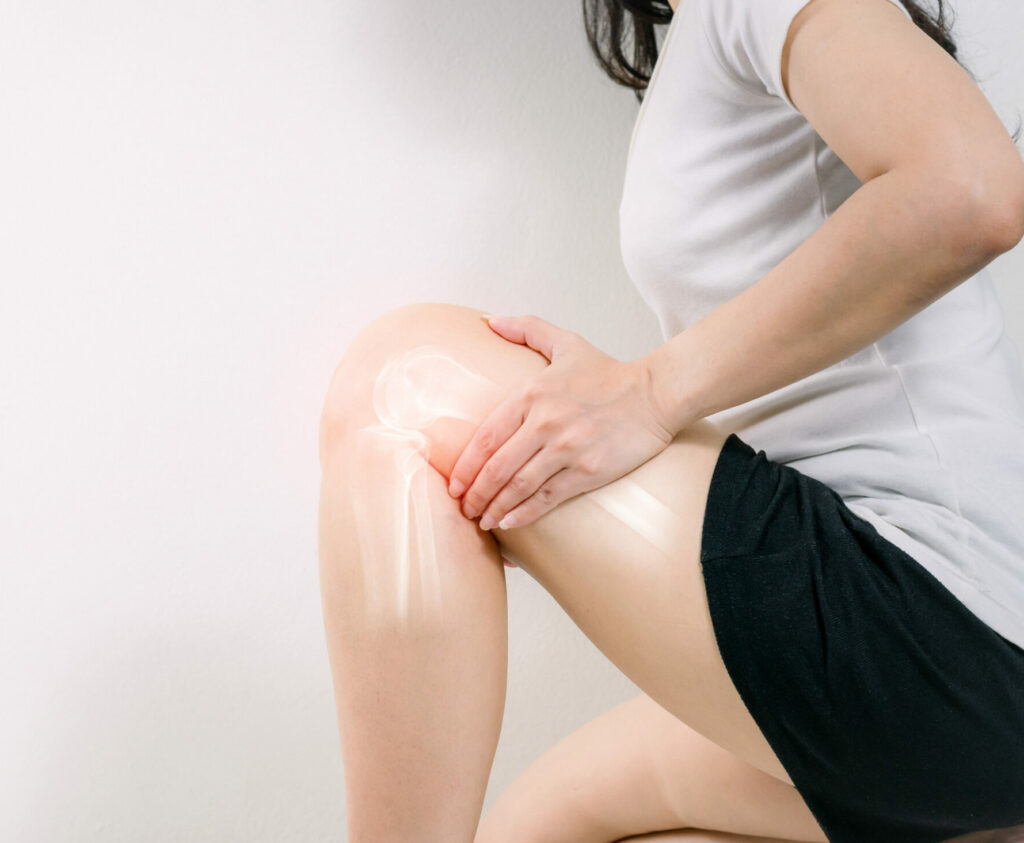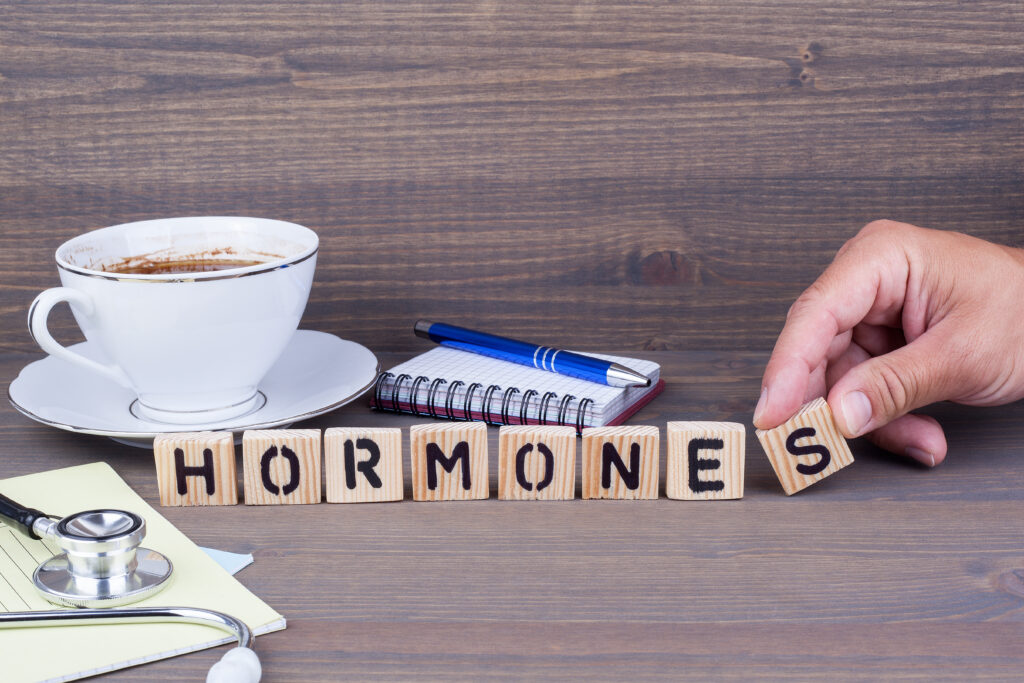Osteoporosis typically develops over a long period of time. In fact, you may not even know you have it until a fall or injury causes a bone fracture. Most commonly, people with osteoporosis will break their wrist, hip, or spinal bones before being diagnosed with the condition.
Hormones can impact the health of your bones — positively and negatively — and your oestrogen levels can even affect your likelihood of developing osteoporosis. So, how does oestrogen affect osteoporosis, and what can you do about it? Read on to find out more.
What causes osteoporosis?
Your bone health is at its peak when you’re a young adult, up until your late 20s. But from around the age of 35, your bone density will slowly start to decrease.
This happens to everybody, but certain risk factors can cause you to develop osteoporosis or lose bone density faster than other people. Being overweight or having a family history of the condition can increase your risk of being affected by osteoporosis. Other common risk factors are heavy drinking or smoking, and going through menopause.
Women who have gone through menopause are more at risk of developing osteoporosis as they lose bone density for a few years after menopause. This can then lead to osteoporosis, as the bones become weakened and less dense. If you’ve had a hysterectomy, you may also be at a higher risk of osteoporosis (particularly if you have had your ovaries removed).
Low bone density and osteoporosis
Low bone density (also known as osteopenia) is the stage before osteoporosis. If you have osteopenia, you will have lower bone density than the average for your age (though not low enough to be classed as osteoporosis).
Osteopenia causes your bones to become fragile. Early signs of low bone density can include stooped posture and a decrease in height.
Osteoporosis is more likely to develop when your bone density is low and keeps decreasing — however, osteopenia does not always lead to osteoporosis. This is why the upkeep of your bone health is vital if you want to prevent osteoporosis in the future. Typically, osteoporosis will occur when there’s low bone density and other risk factors like low oestrogen levels or a family history of the condition.
The role of oestrogen in bone health
Oestrogen is an important hormone in the body, and it’s needed for more than just maintaining a regular menstrual cycle.
Oestrogen is essential for healthy bones, as it enables your body to produce osteoblasts — the cells that create new bone.
While oestrogen levels fluctuate and may vary during the menstrual cycle, they drop rapidly and remain low after menopause. This can lead to a decrease in bone density.
How does oestrogen affect osteoporosis?
When oestrogen is low, it can affect your bone metabolism. This is because the body can’t produce the right cells to keep your bones as strong and healthy as they need to be. Low bone density can then lead to osteoporosis.
Some people can be more at risk of osteoporosis caused by low oestrogen. For example, women who have gone through menopause, women who have had a hysterectomy and people who have eating disorders such as anorexia or bulimia. All of these things can decrease the amount of oestrogen your body can produce — leading to possible osteoporosis.
Oestrogen hormone therapy for osteoporosis
While there is no cure for osteoporosis, there are treatments out there that aim to reduce the impact it has on your body.
Hormone replacement therapy (HRT) can be used to manage menopausal symptoms and treat osteoporosis. It works by increasing your levels of oestrogen, which helps protect against osteoporosis.
Using hormone replacement therapy to increase your oestrogen levels could help to maintain bone density, strengthen bones, and prevent them from breaking or fracturing so easily.
Oestrogen hormone therapy isn’t suitable for everyone. Whether HRT is right for you will depend on a number of factors, such as your age and symptoms. If you believe your oestrogen levels are low but aren’t able to have hormone therapy for these reasons, you’ll need to speak with your doctor to find out what they can offer you instead.
Can osteoporosis be prevented?
The best way that you can prevent osteoporosis is by living a healthy lifestyle and ensuring you know the signs well enough that the condition can be detected early.
When it comes to maintaining your bone health, you want to do your best to eat well and exercise regularly. Weight-bearing exercises are said to help boost your bone density, as well as prevent osteoporosis.
Calcium is important for your bone health. Foods like leafy green vegetables, tofu and dairy are rich in calcium — so be sure to include them in your diet.
Vitamin D is necessary for strong bones too, so try adding more oily fish, eggs, and red meat into your diet. If you don’t eat meat or animal products, then taking vitamin D supplements may be a good option for you.
Smoking is associated with an increased risk of osteoporosis. If you smoke, quitting can help improve your bone health. Similarly, alcohol is said to degrade your bone health, which can lead to osteoporosis, so limiting your intake is crucial.
How Echelon Health can help you with osteoporosis
At Echelon Health, we offer scans and assessments to help diagnose and prevent diseases early, one of which is osteoporosis. For a fully holistic approach to women’s health we offer the Cullinan Assessment. The Cullinan Assessment is designed for women who are 40 years of age or older and is intended to allow for early detection of diseases associated with this stage of life as well as the diseases that are the leading causes of premature death in women, including coronary heart disease and ovarian cancer. The following scans are part of this assessment:
- Medical questionnaire
- Comprehensive bloods + Hormonal Profile + cancer markers
- Digital mammogram
- Transvaginal Ultrasound
- ECG
- CT Coronary angiogram
- CT Chest
- CT Bone Density
- Full Body Mole Check
- Final consultation
The CT Bone Density scan will be key at looking at your bone health and detecting early signs of osteoporosis. Get in touch with our team of experts at Echelon Health and discover what assessments and tests can help you take control of your health. We are always happy to assist with your questions and arranging your health assessments.
Sources:
- https://www.nhs.uk/conditions/osteoporosis/
- https://www.echelon.health/zh-hans/disease_detection/osteoporosis/
- https://www.endocrineweb.com/conditions/osteoporosis/estrogen-replacement-therapy-osteoporosis
- https://www.medicalnewstoday.com/articles/estrogen-and-osteoporosis
- https://pubmed.ncbi.nlm.nih.gov/8865143/
- https://www.nia.nih.gov/health/osteoporosis
- https://www.nhs.uk/conditions/osteoporosis/prevention/
- https://www.mayoclinic.org/healthy-lifestyle/adult-health/in-depth/bone-health/art-20045060



